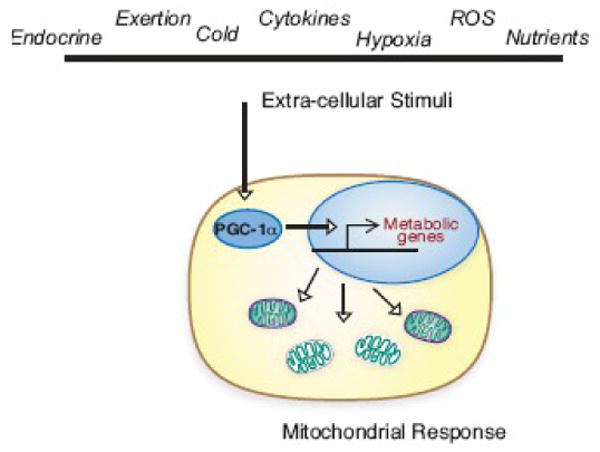Peroxisome proliferator-activated receptor gamma coactivator 1-alpha (PGC1α) plays a pivotal role in cellular energy homeostasis and is known for its capacity to regulate mitochondrial function. As we age, the expression and activity of PGC1α decline, leading to mitochondrial dysfunction, increased oxidative stress, and impaired cellular metabolism. This decline is associated with several age-related diseases, including neurodegenerative disorders, cardiovascular diseases, and metabolic syndromes.
 Fig. 1 Mitochondrial metabolism can be regulated rapidly through changes in PGC-1α transcriptional activity. (Anderson R and Prolla T, 2009)
Fig. 1 Mitochondrial metabolism can be regulated rapidly through changes in PGC-1α transcriptional activity. (Anderson R and Prolla T, 2009)
CD BioSciences offers a range of services to help clients discover and develop anti-aging drugs that target the PGC1α signaling pathway.
How Do We Develop Anti-Aging Drugs Targeting PGC1α?
Drug screening and optimization
We utilize advanced high-throughput screening (HTS) techniques to rapidly evaluate thousands of small molecules and biologicals for their potential to activate PGC1α. Our services allow clients to identify lead candidates that possess promising biological activity. We also help clients improve the potency, selectivity, and pharmacokinetic properties of drug candidates by modifying the molecular scaffold.
Preclinical testing
Our experts help clients evaluate the anti-aging effects of drugs targeting the PGC1α signaling pathway in various experimental models. We help clients induce cellular senescence in cells to evaluate how treatments with anti-aging drugs targeting PGC1α affect the senescence marker. We also use aging mouse, Drosophila, and zebrafish models to study the systemic effects of these drugs.
Targeting PGC1α in Aging-Related Diseases
CD BioSciences supports clients in evaluating anti-aging drugs that target the PGC1α pathways across various age-related diseases.
- Sarcopenia. PGC1α is essential for maintaining muscle function. We help clients analyze whether anti-aging drugs targeting PGC1α can restore mitochondrial function in aged muscle cells and improve muscle strength.
- Aging-related cardiovascular diseases. Our experts help clients examine whether anti-aging drugs targeting the PGC1α signaling pathway enhance cardiac resilience and reduce the incidence of aging-related cardiovascular diseases.
- Aging-related metabolic diseases. Our assessment services include measuring glucose and insulin levels to determine the efficacy of these drugs in maintaining metabolic health.
- Aging-related neurodegenerative diseases. PGC1α has been implicated in neuroprotection and mitochondrial health in neurons. We help clients conduct the Morris water maze or Y-maze tests to evaluate spatial learning and memory before and after treatment with anti-aging drugs targeting PGC1α. We offer assays to assess mitochondrial function, including ATP production and oxygen consumption rate (OCR).
PGC1α plays a central role in energy metabolism and influences tissue-specific aging. CD BioSciences focuses on the PGC1α pathway as a target for anti-aging drug discovery. If you are interested in our services, please feel free to contact us or make an online inquiry.
Reference
- Anderson R, Prolla T. PGC-1alpha in aging and anti-aging interventions. Biochim Biophys Acta, 2009, 1790 (10): 1059-66.
All of our services and products are intended for preclinical research use only and cannot be used to diagnose, treat or manage patients.



 Fig. 1 Mitochondrial metabolism can be regulated rapidly through changes in PGC-1α transcriptional activity. (Anderson R and Prolla T, 2009)
Fig. 1 Mitochondrial metabolism can be regulated rapidly through changes in PGC-1α transcriptional activity. (Anderson R and Prolla T, 2009) 